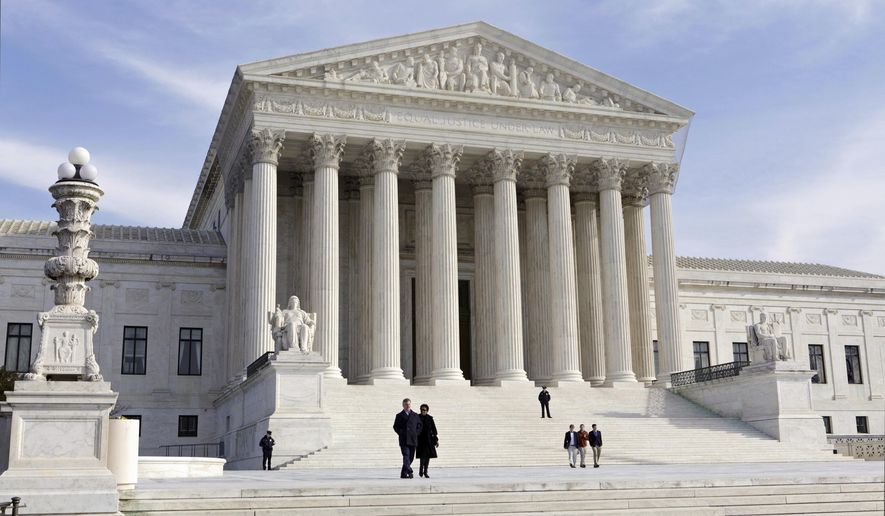The Supreme Court appeared split ideologically Monday on whether to allow a public sector worker to refuse to pay union dues, in a case that could deliver a blow to unions’ pocketbooks.
Unions say they are entitled to the fees because they’re negotiating on behalf of all public workers — even those who don’t choose to join, but who nonetheless benefit from the pay and benefits the unions win.
But Mark Janus, an Illinois state employee, says the union uses his fees — about $50 a month — to negotiate for positions he disagrees with, such as higher government spending.
“What we’re talking about here is compelled justification and compelled subsidization of a private party, a private party that expresses political views constantly,” said Justice Anthony M. Kennedy, appearing to agree with Mr. Janus.
At issue is the Illinois Public Labor Relations Act, which gave most government workers the legal right to engage in collective bargaining in 1984. Another law applied specifically to teachers. Both laws were backed heavily by public unions at the time and required them to represent both members and nonmembers.
Illinois is one of nearly two dozen states where such fees are mandatory.
The case is one of the most-watched this term, two years after a union dues case ended in a 4-4 deadlock. Conservative activists are hoping that with Justice Neil M. Gorsuch bringing the court to nine members, they will be able to reach a decision and rein in the powerful unions.
Justice Gorsuch did not ask any questions during the arguments on Monday, leaving his leaning in the case unclear.
However, his fellow GOP-appointed justices questioned the lobbying efforts of unions and how they’ve grown increasingly political.
Justice Samuel A. Alito asked the Illinois Solicitor General David L. Franklin if there were limitations on the state to compel its employees to speak.
“When you compel somebody to speak, don’t you infringe that person’s dignity and conscience in a way that you do not when you restrict what the person says?” Justice Alito asked.
“What we’re talking about here is a compelled payment of a fee. So, it’s one step removed from compelled speech,” Mr. Franklin said.
Liberal-leaning justices, meanwhile, said ruling in favor of Mr. Janus would mean overturning a clear 1977 precedent, Abood v. Detroit Board of Education, which upheld mandatory public-sector union fees.
The Supreme Court has repeatedly flirted with overturning Abood, including the 4-4 deadlock of just a couple of years ago, when the Obama administration had argued in favor of the unions.
The Trump administration has reversed that stance, sparking criticism from Justice Sonia Sotomayor who said this was the latest in a line of reversals from the new Justice Department.
“This is such a radical new position on your part,” she said.
Other public-sector unions are closely watching the case because they fear a major loss of power should workers be allowed to withhold fees.
They are particularly afraid of what happened in Wisconsin, which scrapped public employee collective bargaining in 2011.
Wisconsin’s union membership rates fell from higher than the national average to below in three of the past five years with many members opting out.
Justice Elena Kagan said ruling in favor of Mr. Janus could upend union relationships across the country.
“Thousands of municipalities would have contracts invalidated. Those contracts probably cover millions, maybe up to over 10 million, workers,” she said. “When have we ever done something like that?”
Andrew M. Grossman, a partner at BakerHostetler, said he predicts the court will side with Mr. Janus.
“At a minimum, its holding is likely to substantially narrow the union activities that non-members can be compelled to support. Or there may be 5 votes to strike down agency fees entirely. No way to tell,” Mr. Grossman tweeted after the arguments.
• Alex Swoyer can be reached at aswoyer@washingtontimes.com.




Please read our comment policy before commenting.